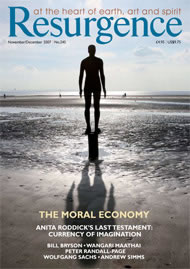FOR WELL OVER three centuries we have been, as humans, attempting to separate ourselves from the organic processes of the natural world. By separating the human self from a larger inclusion in Nature and the universe we have proceeded to deepen the chasm of alienation of the human from the natural world. In the broader cultural and historical context we are involved in deeply dysfunctional endeavours. We are now encountering a host of critical thinking that views the enterprise of modern technological science as deeply problematic. In Brian Goodwin’s recent work Nature’s Due: Healing Our Fragmented Culture we find a contemporary scientist who brings a deeply critical perspective to the outcomes of modern technological interventions.
Goodwin’s critical eye covers a vast range of outcomes of objective technological science. Our deeply disordered technological interventions are experienced as a global crisis in health, in community relations, in habitat, species and cultural destruction and in changing the very climate of the planet. All of this and more arises from our separation of Nature and culture, of quantity and quality, and of control and participation. Speaking as both scientist and educator, Goodwin maintains that the direction of the modern scientific enterprise raises deep foundational issues on how we are educating ourselves in the contemporary world. Nature’s Due shares his personal learning journey over a period of five years as both a teacher and a learner in the holistic science Master’s programme at Schumacher College. The reader of this book gets to look at the process thinking of a distinguished biologist who is forging a learning journey toward a transformed vision of science that goes beyond the constraints of the mechanistic reductionism of modern science.
In Nature’s Due we see an eminent scientific scholar and mentor who forges a different attitude towards the natural world that fosters a ‘feeling’ of the organicity within all aspects of the ‘web of life’. He is attempting a shift in the emphasis of science away from the dichotomies of the modern Cartesian system to a postmodern science based on a dynamic open systems framework that is organic and holistic and in the more inclusive Earth context.
In opposition to a framework that separates values and facts, Goodwin presents a more holistic interpretation bringing facts and values together in dynamic interaction. The natural world must be known and revealed in all our relations with it, in the sense of a participant-observer relationship rather than a detached viewpoint separated from the natural world. The tacit unconscious dimensions of the mind (intuition) must be valued, and descriptions of the world must be a mixture of the abstract and the concrete, with qualitative description being valued on an equal plane as quantitative description. The mind must be considered to be part of the natural world, and the mind/body, subject/object relationships must be aspects of the same integrative process.
Finally, logic must be both/and rather than either/or. Organicity must be reintroduced within a postmodern system where life processes are not reducible to components and where Nature is considered to be alive. Goodwin does not use the word ‘sacred’ but he locates the human world as a participant in the deep creative unfolding processes of the universe. For humans, this opens our horizons to the revelatory mysteries of Nature. In moving into the participatory processes of the universe, we experience a deeper appreciation of all aspects of reality. As humans, we will be able to experience our place in Nature as part of a complex web of life.
Goodwin’s book holds in it the excitement of new beginnings. It reads like a primer for the Great Work. It has a breathtaking range of scholarship that takes the reader on a journey of discovery through cultural history, scientific history, paradigm change, modern systems theory, chaos theory, evolutionary biology and a new field called biological hermeneutics. In his final chapter, ‘Living the Great Work’, he explores the pathways of transformation in which we may participate to bring a radical shift in focus leading to sustainable living on this Earth. He outlines the scope and magnitude of this venture toward sustainability. It involves the work of forging a holistic science, a new art, and a movement towards natural design. This also means revisioning our legal institutions of jurisprudence, economics and our educational systems. The range of these concerns constitutes the ‘Great Work’ of the 21st century.
Envision the beginnings of holistic ecological design; of art that transforms communities toward sustainable living. A recent example might be the artists’ initiative that led to the shutting down of all public lighting including historic monuments in London, Rome and Paris for an hour. Imagine new technologies based on holistic science that are more fully ecological within the web of life. While Goodwin is one of a distinguished and diverse group of scholars supporting this complex paradigmatic shift, what he brings particularly to this emerging literature is an ethos of care for the natural world that offers, and practises, love in all our relations.






